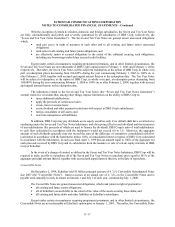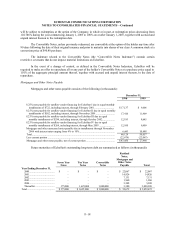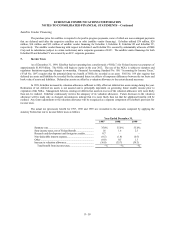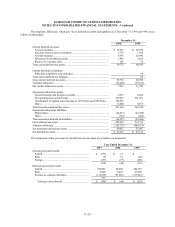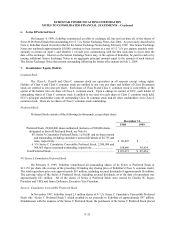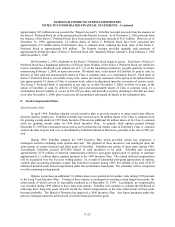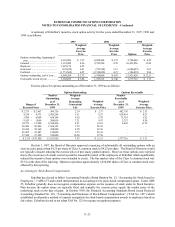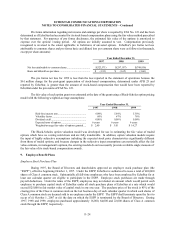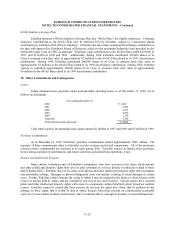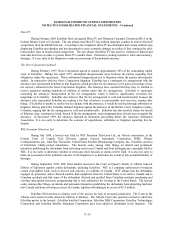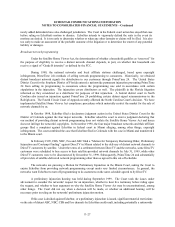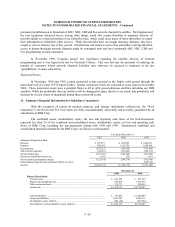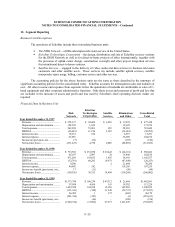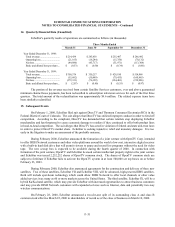Dish Network 1999 Annual Report Download - page 75
Download and view the complete annual report
Please find page 75 of the 1999 Dish Network annual report below. You can navigate through the pages in the report by either clicking on the pages listed below, or by using the keyword search tool below to find specific information within the annual report.ECHOSTAR COMMUNICATIONS CORPORATION
NOTES TO CONSOLIDATED FINANCIAL STATEMENTS – Continued
F–27
newly added defendants have also challenged jurisdiction. The Court in the Federal court action has stayed that case
before ruling on EchoStar’s motion to dismiss. EchoStar intends to vigorously defend the suits in the event its
motions are denied. It is too early to determine whether or when any other lawsuits or claims will be filed. It is also
too early to make an assessment of the probable outcome of the litigation or to determine the extent of any potential
liability or damages.
Broadcast network programming
Under the Satellite Home Viewer Act, the determination of whether a household qualifies as “unserved” for
the purpose of eligibility to receive a distant network channel depends, in part, on whether that household can
receive a signal of “Grade B intensity” as defined by the FCC.
During 1998, the national networks and local affiliate stations challenged, based upon copyright
infringement, PrimeTime 24's methods of selling network programming to consumers. Historically, we obtained
distant broadcast network signals for distribution to our customers through PrimeTime 24. The United States
District Court for the Southern District of Florida entered a nationwide permanent injunction preventing PrimeTime
24 from selling its programming to consumers unless the programming was sold in accordance with certain
stipulations in the injunction. The injunction covers distributors as well. The plaintiffs in the Florida litigation
informed us they considered us a distributor for purposes of that injunction. A federal district court in North
Carolina also issued an injunction against PrimeTime 24 prohibiting certain distant signal retransmissions in the
Raleigh area. The Fourth Circuit Court of Appeals recently affirmed the North Carolina Court's decision. We have
implemented Satellite Home Viewer Act compliance procedures which materially restrict the market for the sale of
network channels by us.
In October 1998, EchoStar filed a declaratory judgment action in the United States District Court for the
District of Colorado against the four major networks. EchoStar asked the court to enter a judgment declaring that
our method of providing distant network programming does not violate the Satellite Home Viewer Act and hence
does not infringe the networks’ copyrights. In November 1998, the four major broadcast networks and their affiliate
groups filed a complaint against EchoStar in federal court in Miami alleging, among other things, copyright
infringement. The court combined the case that EchoStar filed in Colorado with the case in Miami and transferred it
to the Miami court.
In February 1999, CBS, NBC, Fox and ABC filed a “Motion for Temporary Restraining Order, Preliminary
Injunction and Contempt Finding” against DirecTV in Miami related to the delivery of distant network channels to
DirecTV customers by satellite. Under the terms of a settlement between DirecTV and the networks, some DirecTV
customers were scheduled to lose access to their satellite-provided network channels by July 31, 1999, while other
DirecTV customers were to be disconnected by December 31, 1999. Subsequently, PrimeTime 24 and substantially
all providers of satellite-delivered network programming other than us agreed to this cut-off schedule.
The networks are pursuing a Motion for Preliminary Injunction in the Miami Court, asking the Court to
enjoin EchoStar from providing network programming except under very limited circumstances. In general, the
networks want EchoStar to turn off programming to its customers on the same schedule agreed to by DirecTV.
A preliminary injunction hearing was held during September 1999. The Court took the issues under
advisement to consider the networks’ request for an injunction, whether to hear live testimony before ruling upon
the request, and whether to hear argument on why the Satellite Home Viewer Act may be unconstitutional, among
other things. The Court did not say when a decision will be made, or whether an additional hearing will be
necessary prior to ruling on the networks’ preliminary injunction motion.
If this case is decided against EchoStar, or a preliminary injunction is issued, significant material restrictions
on the sale of distant ABC, NBC, CBS and Fox channels by EchoStar could result, including potentially a nationwide


